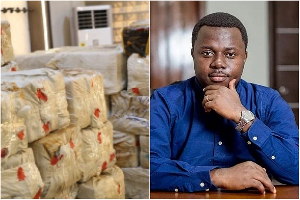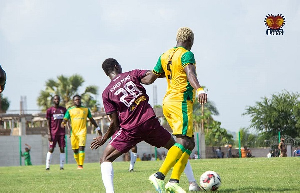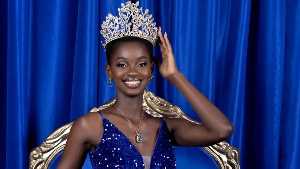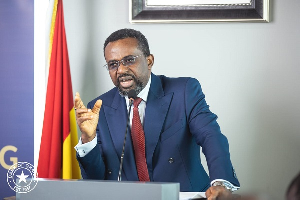(A GNA feature by Josephine Naeke)
Accra , Jan 26, GNA - There is this popular saying, especially by women that whatever men can do women can also do and even do it better. However, this popular adage is not being reflected in politics and especially in Ghana's Parliament. Where are the women?
I was in a vehicle one day when I heard a man asking a woman sitting near the door next to him to let them swap seats for the simple reason that the woman had expressed fear that she might fall off the vehicle because the mate constantly opened it for passengers who were alighting.
After doing her this favour, the man made a remark: “Is it not you women who said whatever a man can do a woman can also do and even do it better, so why are you afraid to sit by the door.”
I told myself in-fact it is not everything men do that women can equally do but the women still do their best in many male dominated areas.
In any case it is not every woman that is afraid to sit by the door of a moving vehicle. Besides, many other men in the same circumstances would express the same fears. Men and women the world over compete for many things and in various endeavors but sometimes it is the male who dominate.
In any case,the cry for women to participate in politics and be part of the decision making process in government is something that gives cause for worry. Currently there are only 19 women Parliamentarians out of the 230 Members of Parliament in Ghana.
Provisional figures from the 2010 Ghana census indicates that Ghana's population is now 24,223,431. This is made up of 12,421,770 females and 11,801,661 males. What are the women doing out there when they even outnumber their male counterparts in society, and why can’t they outnumber them in the House? Are they so much gripped with fear of the unknown - especially the fear of failing to make it to the house, the insults, have they relegated themselves to the kitchen alone as it has often been said to be the place for women?
In the family women are not allowed to take important decisions, and if the family is made up of women and men but men have the upper hand, what do you expect to see in politics - an affair for only men plus a few women of course!
This year is an election year but how many women have secured seats in the house?
God created man and saw that it was not good for a man to live and take decisions alone and so he also created woman as his companion. It is for this reason that women’s participation in the home and in politics is paramount.
A lot has been said time and again that women are their own enemies and it is about time the women prove the men wrong and vote for their fellows in the upcoming and other subsequent elections to champion the cause of all women.
At the last Commonwealth Women Parliamentarian meeting in Accra, the General Secretary of the National Democratic Congress, Johnson Asiedu Nketia, left behind a thought-provoking question, as to the possibility of a party formed by only women. One wondered if the value would not be the same since they will still have to contest with their male counterparts.
A cursory look at Ghana’s parliament is a glaring picture of the deficiency of the female species in the house. It is a male-dominated house with a woman as the Speaker. The big question has always been: "What can be done to encourage women to participate in politics!" - when even the few who are inside are deciding to quit.
Some of the males have spent more than 10 years occupying seats in Parliament which raises the question as to whether they are the repository of all knowledge in their constituencies. Perhaps if a little space was created by these Methuselah MPs some women in their respective constituencies would gain an upper hand to get elected.
It is however ironic that at every political rally women are visibly seen actively singing and shouting party slogans and eagerly pushing their favorite male candidates forward to their own disadvantage.
Mrs Joyce Bamford Addo, Speaker of Ghana’s Parliament also expressed worry that women constituted only 19 per cent of the membership of Parliament in most countries. She said the threshold of 30 per cent advocated by the United Nations as a prelude to 50 per cent attainment to accelerate human development, therefore, continued to be an illusion for advocates of gender mainstreaming.
The Speaker believed the quota system would help women to enter the political arena, but how possible is this method?.
The Commonwealth Women Parliamentarians' African Region was established in 1989 to promote an increase in the participation of women in politics and work towards gender mainstreaming in all programs of member countries. One would be interested in seeing how far this group has gone with getting women to occupy political positions in Africa.
Hopefully, it is not just a platform to exhibit our African designs and demonstrate how articulate we are in talking but all of which ends up getting nowhere. When it comes to women participation in politics, affirmative action in the form of quota system is said to have led to increase in women participation in Uganda, Rwanda and South Africa.
Looking at women participation in politics in Ghana, it is seen that during the Second Republic only 5 women showed up in Parliament in 1979. The number increased to 16 during the First Parliament of the Fourth Republic, and went up to 19 in the Second Parliament of the Fourth Republic inaugurated in January 1997, and reduced to 18 in the Third Parliament of the Fourth Republic in 2001.
There was an increase in women participation in the fourth Parliament of the Fourth Republic to 25 in 2005 and in 2009, the Fifth Parliament of the Fourth republic registered only 19 women out of a total of the 230 members of Parliament.
The forthcoming Parliamentary elections to usher in both men and women Parliamentarians to the house for the sixth Parliament of the Fourth Republic is again showing an undulating picture of the number of women to show up in the house.
Is the problem arising from the various political parties? Is it to do with cultural practices, or is it due to fear, incapability, or funding? The Convention People’s Party (CPP) have signed the African Union's Declaration of 2010-2020 as the African Women's Decade to support all measures to end the marginalization of women in society.
The National Democratic Congress fielded the only woman aspiring to become a Presidential candidate, and also has women on the National Executive Council.
Let us see how these parties translate their enthusiasm to get women into the political arena into the reality of getting them into Parliament and into government.
If globally the percentage of Women in Parliament had increased to 19 per cent from 16 per cent in 2005 and that of Women Ministers of State was still lower, averaging 16 per cent then there is more work to be done to reach parity. Are women themselves eager to take part in politics?To borrow the words of Hajia Mary Salifu Boforo, globally women remain sidelined from the structures of governance that determine political and legislative priorities.
When women's participation reaches parity, the traditional men-centered politics characterized by authority, domination, and sometimes violence, would yield to politics that is characterized by love, caring, cooperation, sacrifice and honesty. We look forward to see that time.
Therefore, to women everywhere, your destiny is in your hands to embrace politics and the Affirmative Action bill still before the House, when passed, should enable women to implement it to the letter and let the world see an overhaul of dominance of women in governance and in Parliament.
Opinions of Saturday, 28 January 2012
Columnist: GNA














